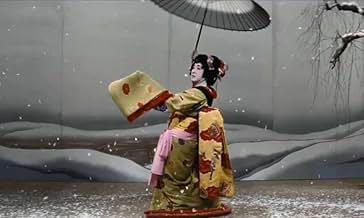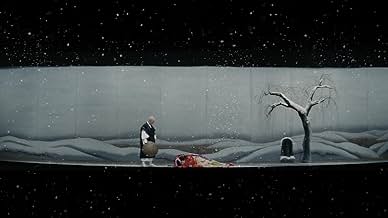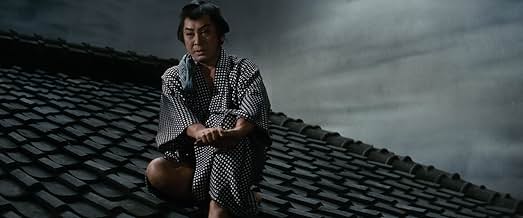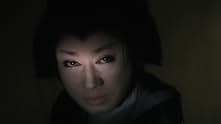IMDb RATING
7.3/10
3.1K
YOUR RATING
Yukinojo, a Kabuki actor, seeks revenge by destroying the three men who caused the deaths of his parents. Also involved are the daughter of one of Yukinojo's targets, two master thieves, and... Read allYukinojo, a Kabuki actor, seeks revenge by destroying the three men who caused the deaths of his parents. Also involved are the daughter of one of Yukinojo's targets, two master thieves, and a swordsman who himself is out to kill Yukinojo.Yukinojo, a Kabuki actor, seeks revenge by destroying the three men who caused the deaths of his parents. Also involved are the daughter of one of Yukinojo's targets, two master thieves, and a swordsman who himself is out to kill Yukinojo.
- Awards
- 1 win total
Featured reviews
As the curtains move aside, those wanting straight-up blood and carnage, will find that "AN ACTOR'S REVENGE" goes down a different path, in what is more a patient theatrical drama of cunning revenge. And a visually striking one too. I was impressed by the audacious wide scope photography and tonal lighting of its stylistic aesthetics, which helped set up the mood and story.
Kazuo Hasegawa superbly plays a kabuki lead actor Yukinojo Nakamura, specializing as an onnagata (otherwise a female impersonator). His travelling troupe happens to be performing in the village of the three men who drove his parents to suicide when he was a child. How he goes about his revenge is like an actor playing out a part, yet he obviously takes no pleasure out of it with conflicting thoughts and hesitations. Keeping to his strengths though, he manipulates everything to his advantage using his talents and sensuality to a spin a web, and in doing so, causing unwanted grief without physical harm. He doesn't want them to die a swift death, but he wants to ruin them in the attempt to drive them mad, like they did to his parents.
The material interestingly looks at how sometimes in this quest innocence can be a casualty, and even completing this vengeance, the emotions can't fulfill that loneliness that will always linger. Sometimes that emptiness is replaced by haunting thoughts of those you destroyed to see it through. As this revenge is set in motion, there are certain unplanned obstacles, leading him to show his skill with the blade. To be honest, the few moonlight standoff scenes are quick and nothing spectacular, but it's the imagery and framing of those moments that do stand out. Director Kon Ichikawa does so much with so little. Etched with dazzling details, compact sets, thick on slow exposition and meditative characters (even jarring comic relief) in what is a classy, if distant stage play brought to life.
Kazuo Hasegawa superbly plays a kabuki lead actor Yukinojo Nakamura, specializing as an onnagata (otherwise a female impersonator). His travelling troupe happens to be performing in the village of the three men who drove his parents to suicide when he was a child. How he goes about his revenge is like an actor playing out a part, yet he obviously takes no pleasure out of it with conflicting thoughts and hesitations. Keeping to his strengths though, he manipulates everything to his advantage using his talents and sensuality to a spin a web, and in doing so, causing unwanted grief without physical harm. He doesn't want them to die a swift death, but he wants to ruin them in the attempt to drive them mad, like they did to his parents.
The material interestingly looks at how sometimes in this quest innocence can be a casualty, and even completing this vengeance, the emotions can't fulfill that loneliness that will always linger. Sometimes that emptiness is replaced by haunting thoughts of those you destroyed to see it through. As this revenge is set in motion, there are certain unplanned obstacles, leading him to show his skill with the blade. To be honest, the few moonlight standoff scenes are quick and nothing spectacular, but it's the imagery and framing of those moments that do stand out. Director Kon Ichikawa does so much with so little. Etched with dazzling details, compact sets, thick on slow exposition and meditative characters (even jarring comic relief) in what is a classy, if distant stage play brought to life.
This movie is that rare species - a film that doesn't take itself seriously for a moment, and yet is stunningly well made and original.
According to Donald Richies '100 Years of Japanese Cinema' the director was forced to make this movie (the remake of a popular but very hammy 1930's original) as a punishment for his self indulgence in earlier movies. He responded by turning up the campiness to '11' in Spinal Tap terms.
Kon Ichikawa manages to take the story of a famous Kabuki female impersonator who wrecks revenge on three powerful men who killed his parents both beautiful (the scenery and photography is stunning) and queasy - everyone seems to fall in love with the rather ugly and very feminine leading 'man'. The story is irrelevant (presumably deliberately so), its all an exercise in style. You can see where Suzuki and many other later directors got a lot of their ideas. Kon is a very talented and skillful film maker so despite the fact that the cast are clearly playing it up for laughs, it is extremely well made, with wonderful sets and tight editing. Despite its origins, it is genuinely entertaining and required viewing for anyone with an interest in Kabuki or Japanese design.
According to Donald Richies '100 Years of Japanese Cinema' the director was forced to make this movie (the remake of a popular but very hammy 1930's original) as a punishment for his self indulgence in earlier movies. He responded by turning up the campiness to '11' in Spinal Tap terms.
Kon Ichikawa manages to take the story of a famous Kabuki female impersonator who wrecks revenge on three powerful men who killed his parents both beautiful (the scenery and photography is stunning) and queasy - everyone seems to fall in love with the rather ugly and very feminine leading 'man'. The story is irrelevant (presumably deliberately so), its all an exercise in style. You can see where Suzuki and many other later directors got a lot of their ideas. Kon is a very talented and skillful film maker so despite the fact that the cast are clearly playing it up for laughs, it is extremely well made, with wonderful sets and tight editing. Despite its origins, it is genuinely entertaining and required viewing for anyone with an interest in Kabuki or Japanese design.
A fascinating and painterly film. It often made obvious that it was filmed in a studio. It was very influential and much admired among filmmakers when first released outside of Japan.
Previously filmed in 1935.
Two things to know to better understand the story:
1. Kabuki Actors who specialized in female roles ('onnagata' or 'ayame') used to dress as women even when off the stage. They would wear a piece of purple silk in their hair to hide the area of their scalp that they were required to shave to make them less attractive to other men.
2. Schools of martial arts, painting, etc. were run by a master ('iemoto') whose word was law. Generally each school had secret teachings that were only revealed to selected students as the master's order.
Previously filmed in 1935.
Two things to know to better understand the story:
1. Kabuki Actors who specialized in female roles ('onnagata' or 'ayame') used to dress as women even when off the stage. They would wear a piece of purple silk in their hair to hide the area of their scalp that they were required to shave to make them less attractive to other men.
2. Schools of martial arts, painting, etc. were run by a master ('iemoto') whose word was law. Generally each school had secret teachings that were only revealed to selected students as the master's order.
There are some truly beautiful scenes here, particularly the marvellous use of widescreen in the colourful kabuki sequences and Kazuoha Segawa is faultless in the duel central role. He plays dressed as a woman on the stage but seems also to live out his life this way and he also plays his thieving side-kick. Apparently played for laughs throughout it is difficult for a non Japanese to fully appreciate much of the subtlety and Shakespearean style play on words. Indeed, for me, the whole is rather too mannered and stagey. There is much blurring between stage and 'real life' which some find charming but I tend to find rather confusing and lifeless.
10mkiem
Ichikawa supposedly made this movie "to see what cinema could do." He pulls out all the stops and the result is a masterpiece of visual splendor, wit and style that is stunning as well as very entertaining. The story of a man taking revenge against the people who killed his parents is an old cliched melodrama that was assigned to him. But he turns necessity into a virtue by glorifying the kitsch while at the same time keeping an ironic stance. (don't miss a great visual pun involving a gunshot and a crescent moon.)
He uses the widescreen to full effect in adopting the aesthetics of the Kabuki theater. The sheer visual inventiveness of the movie makes for the best kind of eye candy. There are bold splashes of primary colors and dramatic, very theatrical lighting. Some sets are intentionally artificial-looking while others are not. Somehow the two styles don't clash but instead portray the perfect intermingling of theater and cinema. Similarly, the use of jazz and lounge music(!) seems perfectly appropriate.
Hasegawa, the lead actor, played the same role in a previous version of the movie nearly 30 years earlier. A man who acts like a woman, seducing a woman young enough to be his daughter lends a touch of the bizarre which just makes things more interesting. The movie is graced by Ayako Wakao, at the height of her incredible beauty.
He uses the widescreen to full effect in adopting the aesthetics of the Kabuki theater. The sheer visual inventiveness of the movie makes for the best kind of eye candy. There are bold splashes of primary colors and dramatic, very theatrical lighting. Some sets are intentionally artificial-looking while others are not. Somehow the two styles don't clash but instead portray the perfect intermingling of theater and cinema. Similarly, the use of jazz and lounge music(!) seems perfectly appropriate.
Hasegawa, the lead actor, played the same role in a previous version of the movie nearly 30 years earlier. A man who acts like a woman, seducing a woman young enough to be his daughter lends a touch of the bizarre which just makes things more interesting. The movie is graced by Ayako Wakao, at the height of her incredible beauty.
Did you know
- TriviaOriginally designed as a tribute to actor Kazuo Hasegawa, whose 300th film this was. The film was based Teinosuke Kinugasa's Yukinojô henge: Daiippen (1935) which also starred Hasegawa in the same dual role.
- ConnectionsVersion of Yukinojô henge: Daiippen (1935)
- How long is An Actor's Revenge?Powered by Alexa
Details
- Release date
- Country of origin
- Language
- Also known as
- Snow of Strange Change
- Production company
- See more company credits at IMDbPro
- Runtime
- 1h 55m(115 min)
- Sound mix
- Aspect ratio
- 2.35 : 1
Contribute to this page
Suggest an edit or add missing content


































